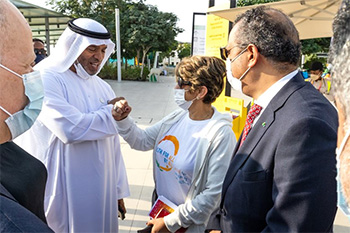
13 October 2022 – Qatar set a goal of achieving at least one WHO Healthy City accreditation by 2022 only to get there ahead of schedule when, in 2021, both Doha and Al Rayyan were awarded the designation. The Healthy Cities Programme makes health a central concern in all aspects of city administration, from transportation to waste management.
In Somalia, solar-powered medical oxygen systems are saving lives, demonstrating how innovation can accelerate impact in fragile settings. When the COVID-19 pandemic hit only 26% of medical facilities surveyed in Somalia had an oxygen source. Now, solar-powered oxygen systems are being used in four locations to treat a wide range of patients, from delivering mothers and newborns to the elderly.
Sudan has taken a significant step forward in transforming its health system by defining a Priority Benefits Package covering primary, secondary and tertiary care.
A unique partnership in which WHO is working with the private sector to address a public health challenge is saving acutely malnourished children in northeast Syria where 11 years of conflict have caused widespread food insecurity.
In 2021, 481 children were treated at a new specialized nutrition centre serving three governorates in the northeast. Thanks to expert care and clinical nutritional supplies, 97% were cured.
In Tunisia, where tobacco use causes a fifth of all deaths, a new law has been passed that strengthens regulations on tobacco product packaging. From 2023, warnings will need to cover 70%, rather than the current 30%, of packaging and include stark images alongside text.
 The United Arab Emirates hosted a global celebration of Universal Health Coverage Day during Expo 2020. The event brought together decision-makers and experts under the theme “Leave no one’s health behind: Invest in health systems for all” and provided a forum for an invaluable exchange of experiences and perspectives.
The United Arab Emirates hosted a global celebration of Universal Health Coverage Day during Expo 2020. The event brought together decision-makers and experts under the theme “Leave no one’s health behind: Invest in health systems for all” and provided a forum for an invaluable exchange of experiences and perspectives.
More than one in four Yemenis are estimated to have mental and psychosocial problems. As Yemen works to expand badly needed mental health and psychosocial support services, WHO is supporting the Ministry of Public Health and Population to create a new National Mental Health Strategy and Programme. So far, more than 3500 health care staff, first responders, school teachers and other professionals have been trained in mental health and psychosocial support.


